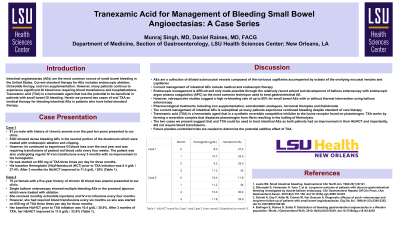Monday Poster Session
Category: Small Intestine
P3255 - Tranexamic Acid for Management of Bleeding Small Bowel Angioectasias: A Case Series
Monday, October 28, 2024
10:30 AM - 4:00 PM ET
Location: Exhibit Hall E

Has Audio

Munraj Singh, MD
LSU Health Science Center
New Orleans, LA
Presenting Author(s)
Munraj Singh, MD1, Daniel Raines, MD, FACG2
1LSU Health Science Center, New Orleans, LA; 2LSU Health, New Orleans, LA
Introduction: Intestinal angioectasias (AEs) are the most common source of small bowel bleeding in the United States. Current standard therapy for AEs includes endoscopic ablation, Octreotide therapy, and iron supplementation. However, many patients continue to experience significant GI blood loss requiring blood transfusions and hospitalizations. Tranexamic acid (TXA) is a hemostatic agent that works by forming a reversible complex that halts fibrinolysis. Herein we present two cases of oral TXA as medical therapy for bleeding intestinal AEs in patients who have failed standard therapy.
Case Description/Methods: Case 1: An 81 yo male with history of chronic anemia over the past ten years presented to our clinic. The patient underwent EGD which showed dense bleeding AEs in the second portion of the duodenum which were treated with endoscopic ablation and clipping. However, he continued to experience GI blood loss over the next year and was requiring blood transfusions every four weeks. The patient was also undergoing regular IV iron transfusions every 3 months with no improvement in his hemoglobin. He was started on 650 mg of TXA three times per day for three months. His baseline Hemoglobin (Hb)/Hematocrit (HCT) prior to TXA initiation was 8.4 g/dL / 27.4%. After 3 months his Hb/HCT improved to 11.2 g/dL / 35% (Table 1).
Case 2: A 75 yo female with a five-year history of chronic GI blood loss anemia presented to our clinic. A single balloon enteroscopy three years ago showed multiple bleeding AEs in the proximal jejunum which were treated with ablation. She then received monthly Octreotide injections and IV iron infusions every four months. However, she had required blood transfusions every six months so she was started on 650 mg of TXA three times per day for three months. Her baseline Hb/HCT prior to TXA initiation was 10.4 g/dL / 30.9%. After 3 months of TXA, her Hb/HCT improved to 11.8 g/dL / 33.9% (Table 1).
Discussion: The current management of intestinal AEs is suboptimal as many patients experience continued bleeding despite standard therapy. The two cases we present suggest that oral TXA could be used to treat intestinal AEs as both patients had an improvement in their Hb/HCT and importantly, did not require blood transfusions. TXA has been studied in the management of major bleeding in other clinical settings including trauma, obstetrics and neurosurgery. Future placebo-controlled trials are needed to determine the potential additive effect of TXA in the treatment of intestinal AEs.
Note: The table for this abstract can be viewed in the ePoster Gallery section of the ACG 2024 ePoster Site or in The American Journal of Gastroenterology's abstract supplement issue, both of which will be available starting October 27, 2024.
Disclosures:
Munraj Singh, MD1, Daniel Raines, MD, FACG2. P3255 - Tranexamic Acid for Management of Bleeding Small Bowel Angioectasias: A Case Series, ACG 2024 Annual Scientific Meeting Abstracts. Philadelphia, PA: American College of Gastroenterology.
1LSU Health Science Center, New Orleans, LA; 2LSU Health, New Orleans, LA
Introduction: Intestinal angioectasias (AEs) are the most common source of small bowel bleeding in the United States. Current standard therapy for AEs includes endoscopic ablation, Octreotide therapy, and iron supplementation. However, many patients continue to experience significant GI blood loss requiring blood transfusions and hospitalizations. Tranexamic acid (TXA) is a hemostatic agent that works by forming a reversible complex that halts fibrinolysis. Herein we present two cases of oral TXA as medical therapy for bleeding intestinal AEs in patients who have failed standard therapy.
Case Description/Methods: Case 1: An 81 yo male with history of chronic anemia over the past ten years presented to our clinic. The patient underwent EGD which showed dense bleeding AEs in the second portion of the duodenum which were treated with endoscopic ablation and clipping. However, he continued to experience GI blood loss over the next year and was requiring blood transfusions every four weeks. The patient was also undergoing regular IV iron transfusions every 3 months with no improvement in his hemoglobin. He was started on 650 mg of TXA three times per day for three months. His baseline Hemoglobin (Hb)/Hematocrit (HCT) prior to TXA initiation was 8.4 g/dL / 27.4%. After 3 months his Hb/HCT improved to 11.2 g/dL / 35% (Table 1).
Case 2: A 75 yo female with a five-year history of chronic GI blood loss anemia presented to our clinic. A single balloon enteroscopy three years ago showed multiple bleeding AEs in the proximal jejunum which were treated with ablation. She then received monthly Octreotide injections and IV iron infusions every four months. However, she had required blood transfusions every six months so she was started on 650 mg of TXA three times per day for three months. Her baseline Hb/HCT prior to TXA initiation was 10.4 g/dL / 30.9%. After 3 months of TXA, her Hb/HCT improved to 11.8 g/dL / 33.9% (Table 1).
Discussion: The current management of intestinal AEs is suboptimal as many patients experience continued bleeding despite standard therapy. The two cases we present suggest that oral TXA could be used to treat intestinal AEs as both patients had an improvement in their Hb/HCT and importantly, did not require blood transfusions. TXA has been studied in the management of major bleeding in other clinical settings including trauma, obstetrics and neurosurgery. Future placebo-controlled trials are needed to determine the potential additive effect of TXA in the treatment of intestinal AEs.
Note: The table for this abstract can be viewed in the ePoster Gallery section of the ACG 2024 ePoster Site or in The American Journal of Gastroenterology's abstract supplement issue, both of which will be available starting October 27, 2024.
Disclosures:
Munraj Singh indicated no relevant financial relationships.
Daniel Raines indicated no relevant financial relationships.
Munraj Singh, MD1, Daniel Raines, MD, FACG2. P3255 - Tranexamic Acid for Management of Bleeding Small Bowel Angioectasias: A Case Series, ACG 2024 Annual Scientific Meeting Abstracts. Philadelphia, PA: American College of Gastroenterology.
